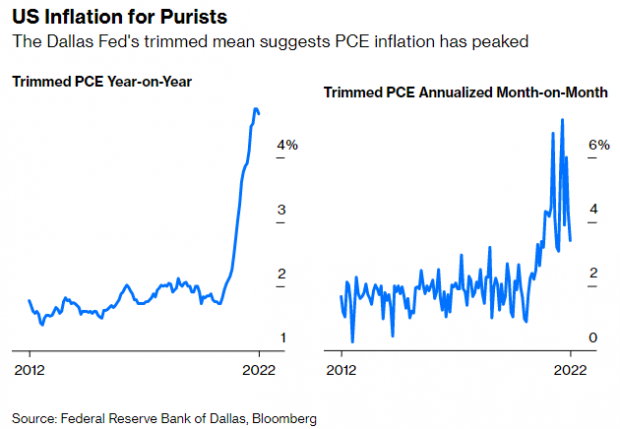Chart of the Day: Has Inflation Already Peaked?
Strong economic data is raising the odds that the Federal Reserve will raise interest rates higher than previously expected and keep rates high for longer. “Stronger demand for labor, stronger demand in the economy than I previously thought, and then somewhat higher underlying inflation suggest a modestly higher path for policy relative to September,” New York Fed President John Williams said last week. “Not a massive change, but somewhat higher.”
At the same time, plenty of economists are concerned that the Fed may go too far in its battle against inflation, since it takes time for monetary tightening to work its way through the economy and show up in the statistics. By the time the official inflation rate drops, it may be too late to stop the economy from falling into a recession.
In an attempt to get ahead of the game, Fed economists look at a range of measures that can provide an early signal of what will happen with overall inflation in the coming weeks and months. As we told you last week, one key measure the Fed looks at, the Personal Consumption Expenditures price index, showed signs of easing last week. Bloomberg’s John Authers on Monday looked at a variation of that measure, the “trimmed mean” version, and found that it suggests that inflation is already slowing.
“The latest hard data on inflation, the Personal Consumption Expenditure deflator for October, did confirm the message that inflation does look as though it may well have peaked,” Authers says. “Using the Fed’s favored measure of the ‘trimmed mean,’ which excludes the greatest outliers and takes the average of the rest, inflation did indeed tick down slightly last month, on both a year-on-year and month-on-month basis. There’s still a long way to go, but it’s important that this stripped-down measure of inflation beloved by purists is no longer accelerating.”
“I don’t think any of this proves that inflation will come down swiftly and allow the Fed to start easing in short order,” Authers adds, “but it does suggest that the economy is slowly turning in the direction that anti-inflationistas want.”


 Yahoo Finance
Yahoo Finance 